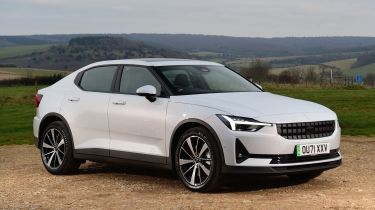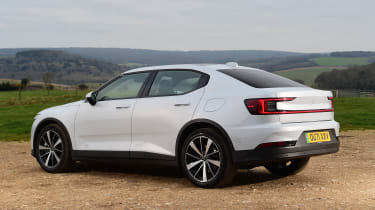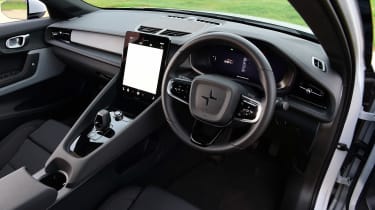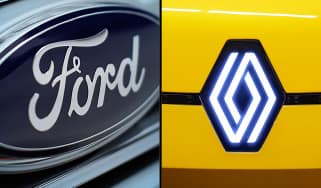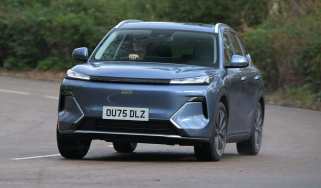Used Polestar 2 (Mk1, 2020-date) review: an upmarket EV with a great real-world range
A full used buyer’s guide on the Polestar 2 which has been on sale since 2020
Verdict
When Polestar launched, its policy was to be a digital brand, which meant that it would have no dealerships because customers would interact with the company only online. However, since 2020 six ‘Polestar Spaces’ have opened (in Glasgow, Manchester, Sheffield, Bicester, Bristol and Birmingham), and judging by the number of Polestar 2 models on the road, business is brisk. We can see why, because while the Model 3 is a slightly better all-rounder thanks to Tesla’s charging network, the roomy cabin and the efficient powertrains, the Polestar comes a close second with its impressive real-world range, upmarket cabin and excellent dynamics. If only the ride wasn’t so firm and rear-seat space wasn’t at such a premium, Polestar could have a segment leader on its hands.
It’s amazing just how quickly things can change in the automotive industry. A decade ago virtually nobody had heard of Polestar, which at that time was essentially a tuning company that had evolved from a racing team called Flash Engineering, which was set up in 1996. By 2009 Volvo was working closely with Polestar; six years later it had taken over the company entirely.
At first Polestar was Volvo’s in-house tuning division, but at the end of the last decade it was in effect spun off as Volvo’s EV division; from the outset Polestar has offered only electric cars (ultra-rare Polestar 1 PHEV aside), while Volvo has moved more gradually towards its goal of offering a fully electrified model line-up by 2025. As the only mainstream model to come from Polestar so far, is the 2 worth considering?
History
The Polestar 2 hit UK roads in autumn 2020. Just one high-spec model was offered, the Long Range Dual Motor at £49,900. This came with a 78kWh battery pack, all-wheel drive and 402bhp spread over two motors, while the Performance pack came as standard.
Used - available now
By April 2021 Polestar had added the £42,900 228bhp Long Range Single Motor (with 78kWh battery pack) and the £39,900 Standard Range Single Motor (with 64kWh battery); the Long Range Dual Motor edition had dropped to £45,900 by this point, but no longer included the Performance Pack.
A facelifted model arrived last autumn, with new motors, upgraded batteries to give greater range and faster charging, plus more standard driver-assistance systems.
Which one should I buy?
No Polestar 2 is lacking in performance, although the Dual Motor model is much quicker than the Single Motor alternatives (0-62mph in 4.7 seconds instead of 7.4). The Long Range models have usefully bigger battery packs, but even the Standard Range edition will do 200-250 miles on a charge.
Because Polestar doesn’t do trim levels, all of these cars come with plenty of standard equipment, but it’s worth looking out to see if any of the option packs are fitted. The Performance Pack adds upgraded (Brembo) brakes, adjustable Ohlins dampers and 20-inch forged alloy wheels. The Plus Pack adds a panoramic glass roof, 13-speaker hi-fi and heating for the steering wheel, along with the front and rear seats. The Pilot Pack adds upgraded headlights, adaptive cruise control, around view, plus various other driver-assistance systems.
Alternatives to the Polestar 2
When the Polestar 2 arrived, there were few alternatives, but over the last three years the segment has got busier. At first the only true rival was the Tesla Model 3, which we think has the edge over the 2, but both are impressive. The BMW i4 is another excellent family EV; it doesn’t offer buyers hatchback practicality, but it is superb to drive and has a brilliant interior, plus an impressive range.
The Hyundai Ioniq 6 offers these same characteristics, although the exterior design isn’t as cohesive. The Volkswagen ID.7 is another family-friendly EV that’s dynamically capable and has a long range, but it’s expensive and there aren’t many on the second-hand market.
What to look for
Power up
When the 2 was updated in autumn 2023, the single-motor editions went from 228bhp to 295bhp, with much more torque too.
Special 1
Just 40 BST Edition 270s (of 270 globally) came to the UK in spring 2023. Each had 469bhp, a lowered ride height and 21-inch wheels.
Special 2
In autumn 2023, 25 BST Edition 230s (of 230 globally) came to the UK. The mechanical spec was the same as the BST Edition 270.
Erratic electrics
An ECU known as the TCAM can behave erratically, leading to electronic glitches. There’s more about this at http://tinyurl.com/mryz43tm.
Interior
Polestar sees itself as a digital brand, and nowhere is this more evident than with the 2’s dashboard, with its LCD instrumentation and switchgear which is all touch-sensitive. Pretty much everything is controlled through the touchscreen, although Polestar’s system is more user-friendly than some rivals.
The cabin is inviting with its premium materials (including vegan-friendly seat trim), and while there’s ample front-seat space, those in the rear have to contend with small door openings and a sloping roof. Boot space is merely okay at 405 litres, or 1,095 litres with the back seats down.
Prices
We found more than 200 used Polestar 2s for sale, the earliest of which are on a 70-plate. Five out of six Polestar 2s have the bigger battery pack, but if the Standard Range is enough, you'll make a decent saving.
To check prices on a specific model head over to our valuation tool.
Running costs
The half-dozen ‘Polestar Spaces’ showrooms are purely for selling cars; all maintenance is done through Volvo’s 100 or so dealerships. The Polestar 2 should be serviced every two years or 20,000 miles, with most of the work focusing on software updates and filter changes, although the brake fluid is changed when required.
Expect to pay £180-£250 per service, and an extra £79 if the brake fluid needs to be renewed. The cost includes replacing the coolant if needed, but this is done on an ad hoc basis. The standard warranty runs for three years or 60,000 miles, while the battery is guaranteed to last for eight years or 100,000 miles.
Recalls
The Polestar 2 has been recalled twice so far, both times in October 2020. The first campaign was launched at the start of the month and affected more than 900 cars produced between December 2019 and September 2020. The problem centred on some faulty software that controlled the Battery Energy Control Module, but this was easily fixed with a software update.
The second campaign was launched at the end of October 2020 and this time it was a hardware problem. Specifically, the battery terminals of almost 700 Polestar 2s made between September 2019 and August 2020 had a plating that could lead to a short circuit within the battery. The solution was to fit replacement inverters to the battery if necessary, with all of this work carried out by Volvo dealers free of charge.
Driver Power owner satisfaction
The Polestar 2 made its Driver Power debut in the 2023 New Car survey, in 17th place out of 75 entries. First places in the engine and gearbox categories as well as for running costs are impressive, as is a second position for safety features. Two 16th places (boot capacity and handling) are welcome, but 73rd for all-round visibility and 72nd for ride quality aren’t so good, while 71st for reliability is worrying.

